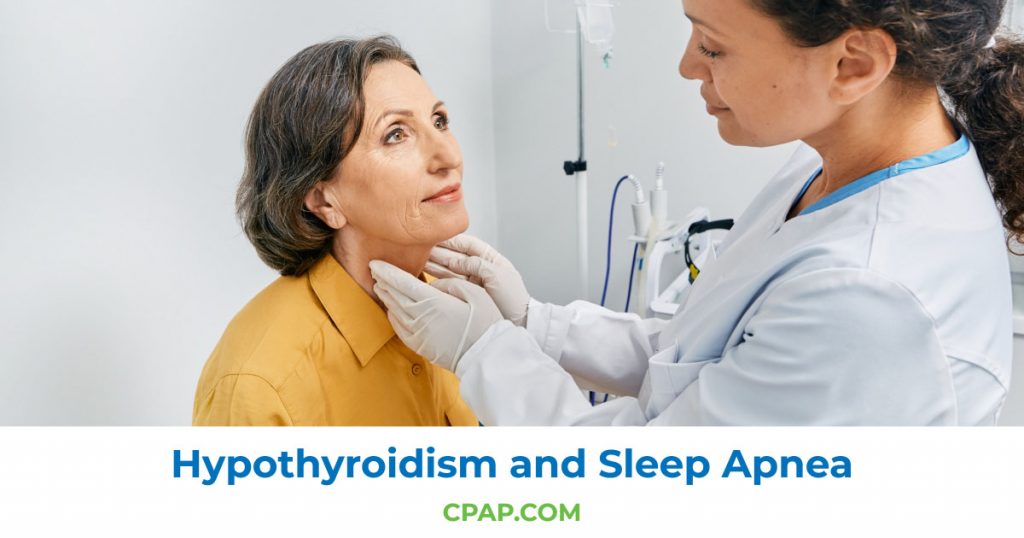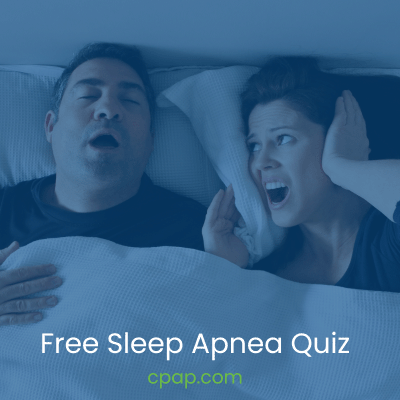
Your thyroid plays a major role in your daily life. The hormones it creates regulate important bodily functions like your heart rate, body temperature, metabolism, and your breathing. When your thyroid secretes too much or too little of these key hormones, it can cause sleep apnea along with other sleeping disorders.
Hypothyroidism means your thyroid doesn’t produce enough thyroxine. Without enough of this hormone, you may have swelling of your thyroid, weight gain, and loss of strength in the muscles that help you breathe properly – all of which can lead to sleep apnea.
Sleep apnea and hypothyroidism share many symptoms so if you’re already diagnosed with hypothyroidism, you might just chalk any exhaustion, apathy, weight gain, mood swings, or lack of concentration you may have experienced up to a hormonal imbalance. That’s why a sleep apnea test is important for thyroid patients that are having trouble sleeping at night.
In this article, you will learn about hypothyroidism, its common symptoms, how to find out if you have sleep apnea, and how these conditions are treated.
What Is Hypothyroidism?
Hypothyroidism is characterized by an underactive thyroid. It doesn’t produce enough of the hormone thyroxine, which leads to a number of medical issues if left untreated.
The symptoms of hypothyroidism usually start off slow. You may first notice fatigue, weight gain, or higher sensitivity to cold temperatures. The longer your body goes without enough of this important hormone, the slower your metabolism gets. That’s when more symptoms begin to develop.
Clear signs of hypothyroidism include a puffy face, constipation, dry skin, and a hoarse voice.
Your thyroid can be affected by autoimmune diseases, certain medications, thyroid surgery, radiation therapy, and treatments for hyperthyroidism, which all have the chance of causing hypothyroidism. The resulting low hormone production is highly treatable with medication.
Outside of Hypothyroidism, there are many other types of thyroid dysfunction, including:
- Hyperthyroidism: The Thyroid Produces Too Much Hormone and Upsets the Balance of the Endocrine System
- Goiter: Swollen Thyroid, Which May or May Not Be Harmless
- Thyroiditis: Inflamed Thyroid, Due to an Infection or Autoimmune Condition
- Thyroid Cancer: Usually Curable Through Traditional Treatment Methods
- Thyroid Nodule: Lumps on the Thyroid, Which Are Usually Non-Cancerous and Harmless, but Can Secrete Excess Hormones and Cause Hyperthyroidism
- Thyroid Storm: Causes Release of Very High Levels of Hormone and Leads to Serious Illness
Can Hypothyroidism Cause Sleep Apnea?
While hypothyroidism doesn’t directly cause sleep apnea, the symptoms that come along with it often lead to a higher risk of developing sleep apnea.
There is a significant association between hypothyroidism and sleep apnea, with a high number of hypothyroidism patients being diagnosed with sleep apnea as well. This link is attributed to the changes happening in your body because of your underactive thyroid.
Hypothyroidism can cause sleep apnea in a couple of different ways.
The thyroid is a butterfly-shaped gland that sits at the front of your neck right by your windpipe. One of the earmarks of hypothyroidism is an enlarged thyroid, which can obstruct your airway and lead to sleep apnea.
Weight gain caused by hypothyroidism can also contribute to obstructive sleep apnea.
Your muscles and nervous system depend on a healthy, functioning thyroid as well. The muscles you use to breathe may grow weaker without the support of thyroid hormones, making it more difficult for you to breathe properly through the night.
Think You May Have Sleep Apnea? Take Our FREE Sleep Apnea Quiz!
Treating Hypothyroidism and Sleep Apnea
Hypothyroidism is easily treated with synthetic hormones to replace what your thyroid can’t make on its own. With proper medication, most signs and symptoms of hypothyroidism begin to disappear and patients begin to feel better.
Sleep apnea is commonly treated with a CPAP machine to help open your airway and keep it open throughout the night so that you can breathe better and sleep better.
In patients who are diagnosed with both conditions, a combination of medication and a CPAP machine is usually necessary to manage them. There is no evidence one way or the other that getting your hypothyroidism under control will lead to a decrease in episodes of sleep apnea. But by treating them both you will see an improvement in your overall symptoms.
How Can Thyroid Patients Get a Sleep Apnea Test?
Waking up feeling drowsy, having a dry mouth or sore throat when waking up, an inability to concentrate throughout the day, or waking up frequently during the night are all symptoms of sleep apnea. Because hypothyroidism can also cause fatigue, lethargy, and apathy, it’s often difficult to separate the two from each other in the beginning.
If you suspect you may be suffering from sleep apnea brought on by hypothyroidism, it’s a good idea to get tested so you know for sure. Persistent fatigue after regular thyroid treatment is a good sign to speak to your doctor about the possibility of sleep apnea.
Sleep apnea is diagnosed through a sleep study where your breathing patterns, movements, blood oxygen levels, and heart, lung, and brain function are all monitored while you sleep. Your doctor will refer you to a sleep disorder center where specialists will evaluate you overnight to determine if you have sleep apnea or not.
At-home sleep apnea tests are also an option for anyone that can’t or doesn’t want to participate in a full sleep study.
Sometimes it’s just not possible to leave home even for an overnight stay, or maybe you just prefer the comfort of your own bed. Either way, these tests make it possible for you to get to the bottom of your concerns without the need to sleep at a clinic.
Getting tested for sleep apnea is important if you are exhibiting symptoms. Once you know for sure, you can treat your sleep apnea alongside your hypothyroidism to enhance your quality of sleep and your quality of life.
Hypothyroidism and Sleep Apnea: Final Thoughts
People diagnosed with hypothyroidism have a higher than average chance of also being diagnosed with sleep apnea. If you are a thyroid patient and suspect you might have developed sleep apnea due to the symptoms of your hypothyroidism, talk to your doctor about scheduling a sleep study.
Alternatively, there’s always the option of an at-home sleep apnea test if you’d prefer to do a sleep study from the comfort of your own bedroom. Not only does it include a free consultation with a real doctor, but it’s also smaller, more comfortable, and just as accurate as a clinical sleep apnea test at diagnosing Obstructive Sleep Apnea.
Even with hypothyroidism treatment, you may still be experiencing fatigue that makes it hard to be productive and enjoy your day. With a sleep apnea diagnosis and treatment, you will have more energy, better concentration, and improved mood during the day as well as more restful sleep at night.





